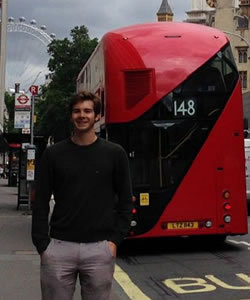Look up. Perched atop his stone horse, the proud and armored King Wenceslas towers over the multitude of locals and tourists, drug dealers and businessmen, as they walk through Prague’s busiest square. This regal figure, flanked by the National Gallery and the Prague State Opera House, portrays the Czech Republic as a nation of heroism and national pride.
Look down. Nobody looks at the statue except tourists; locals only use it as a popular meeting point (“under the tail”), a convenient segue. Look past the prostitutes lurking at the twilit street corners and examine the “locals” with your bright, platonic, indiscreet eyes of a tourist still in the traveler’s honeymoon phase where everything seems “marvelous” and “fascinating” and “lovably different.” Clothes like us, buildings like ours, but stony faces that look straight ahead, averse to all eye contact. A relic of a totalitarian past where everyone was a potential informant. A time when too much of a frown raised suspicion of “lamenting the victory of the working class,” (Kundera, The Joke) but too much of a smile raised the question of “too many inner thoughts,” of intellectualism—a notorious pejorative of the era.
That’s the beauty of Prague: the gradual symbiosis of old communist culture with new post-1989 Western capitalism. I was initially upset upon my arrival to Prague that everything seemed far too westernized and familiar, when I was expecting a post-communist, Eastern European environment bedecked with Stalin statues and hammers and sickles galore, and instead found Costa Coffee and Tesco at every corner. But if you look a little deeper you will find old gems like the cold public face that betrays nothing, or the incredible patience with waiting in line at the grocery store that remains unheard of in America.
However, this dichotomous balance creates striations within Czech society. My homestay grandparents feel a nostalgia for the order, security, and tradition of the communist past. My homestay parents feel a satisfaction with the present, and that the “only good thing about communism was that beer was dirt-cheap.” My homestay brother feels a dissatisfaction with both the past and the present and wants to move to America where he feels he can have greater opportunities.
For Czechs, history is only too vivid, yet every generation perceives it differently. This creates massive stratifications in political party representation shown in areas such as EU approval rating—only 30 percent of Czechs approve EU leadership, and the majority of that percentage originates in citizens from age fifteen to thirty—and political party representation. Nevertheless, general mistrust in Czech politicians has in some ways unified the cross-generational cleavages (by decreasing voter participation all-round), but it has also increased Communist Party representation and spread political power more evenly across the four major parties. The major question, though, is how to restore unity among the Czech populace to once again increase voter turnout and improve government efficiency and accountability. How can we do it? Should we raise the nationalist banner and once again look up at King Wenceslas on his horse?
Unfortunately, that seems an improbable solution. When I asked a Czech friend of mine why nobody looks at the statue anymore, she brushed the question off and led me to another figure a couple of blocks down the road. This statue, created by local artist David Černý, shows King Wenceslas wearing his armor and proud expression, yet he sits astride an upside-down horse that appears either dead or sleeping. “This better represents the Czech people than the statue in Wenceslas Square. That statue, such a grand show of pride and heroism, is nothing like [Czech people]. The Černý, on the other hand, looks more like a guy who just came back drunk from a party and doesn’t realize the horse he is riding is upside down. This is more Czech.”
At the moment the prospect of the westernized democratic system of the Czech Republic hangs on the precipice of devolving back into the socialist mentality of delegative democracy, a state by which the citizens are inactive in politics and thereby “delegate” the political power and decision-making to their leaders. Luckily, a legacy of patience and a knack for black humor have shown that, for the moment, Czechs seem content to ride the horse upside-down, sitting astride a Communist legacy on one side and a Westernized future on the other.

